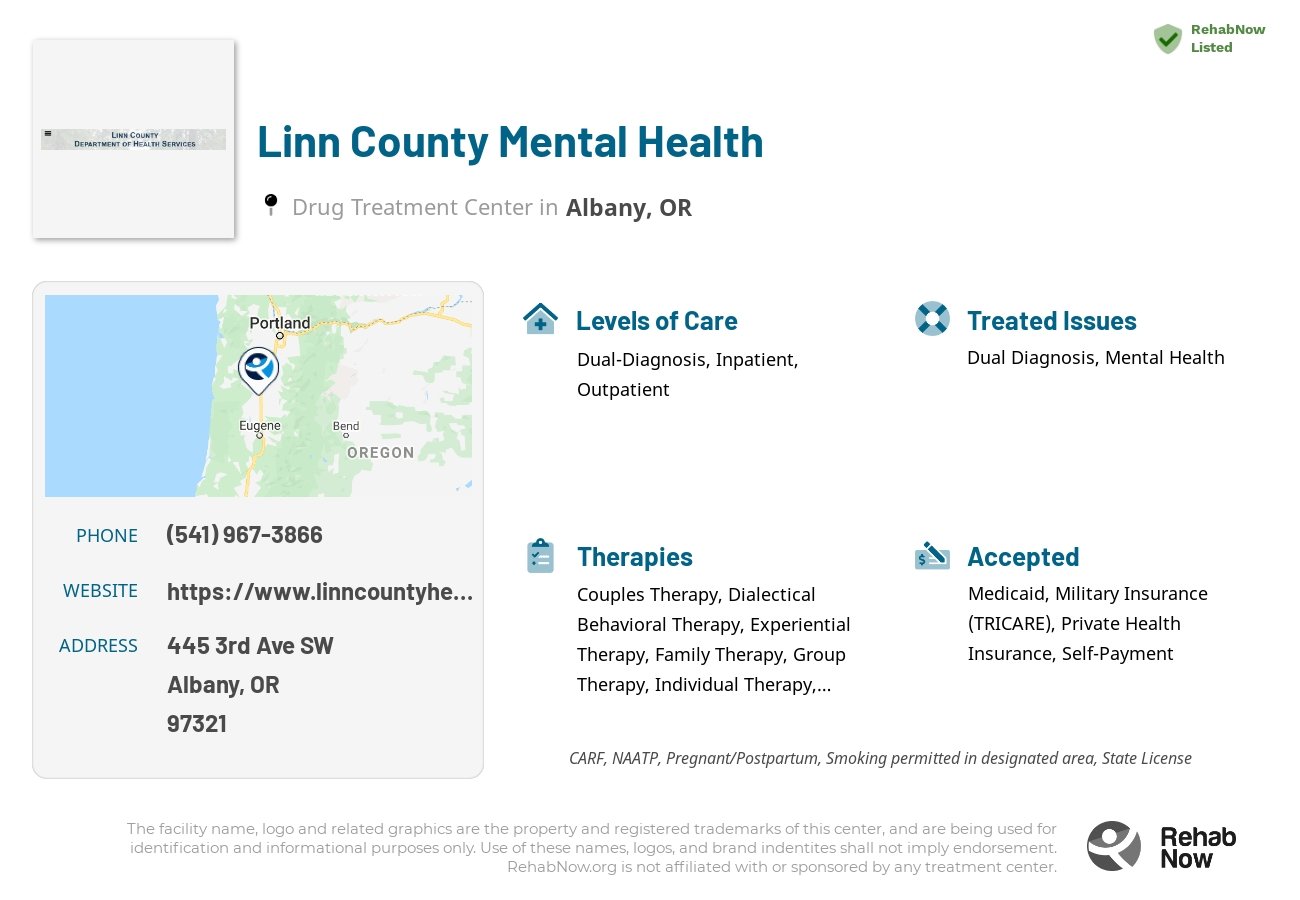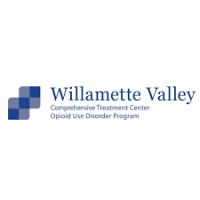Linn County Mental Health
Drug Rehab Center in Albany, Oregon
Linn County Mental Health in Albany, Oregon is a treatment facility specializing in Dual Diagnosis, Mental Health, Opioid Addiction, Drug Addiction, Alcoholism, and Substance Abuse, offering comprehensive services tailored to the unique needs of each individual, including therapy, counseling, group therapy, medication management, inpatient and outpatient programs, and aftercare support.
About This Albany, OR Facility
Linn County Mental Health in Albany, Oregon is a treatment facility that specializes in Dual Diagnosis, Mental Health, Opioid Addiction, Drug Addiction, Alcoholism, and Substance Abuse. They offer a comprehensive range of services to individuals who are seeking recovery from addiction and looking to improve their mental health. With various levels of care available, including Dual-Diagnosis, Inpatient, Outpatient, Aftercare Support, and Detox, Linn County Mental Health strives to tailor treatment plans to the unique needs of each individual. They accept Private Health Insurance, making their services accessible to those with different insurance coverage.
At Linn County Mental Health, individuals struggling with addiction and substance abuse can find a variety of evidence-based treatment methods and services. These include therapy sessions, counseling, group therapy, and medication management for those with co-occurring mental health disorders. The facility is equipped to provide both inpatient and outpatient programs, allowing individuals to receive care in a setting that suits their needs. Additionally, Linn County Mental Health offers aftercare support to help individuals maintain their sobriety and transition back into their daily lives. The facility's focus on Dual Diagnosis ensures that individuals receive comprehensive care to address both their addiction and any underlying mental health issues that may contribute to their substance abuse.
Genders
Ages
Modality
Additional
Conditions and Issues Treated
People with dual diagnosis have coexisting addiction and a mental disorder. 9.2 million US adults had a co-occurring disorder in 2018, so not just limited to Oregon residents. Best treatment combines medication, psychotherapy (talk therapy), support group, and inpatient rehabilitation. Sometimes, complementary therapies – yoga, massage, and acupuncture – may also be used.
Levels of Care Offered
This center offers a variety of custom treatment tailored to individual recovery. Currently available are Dual-Diagnosis, Inpatient, Outpatient, with additional therapies available as listed below.
Inpatient rehab is intended to treat severe addictions and co-occurring disorders. The length of stay in Oregon varies from four weeks to six months according to the individual needs. Inpatient rehab ensures that the patient stays in a substance-free environment at Linn County Mental Health.
Outpatient treatment can be considered the lowest intensity level of addiction treatment in Albany, OR. It is ideal for early phase addiction or lower intensity addictions. Linn County Mental Health peer group support, 12-step programs, and individual counseling may still be involved.
Linn County Mental Health‘s Therapies & Programs
Individual therapy aims to identify the core issues that would have led the patient to substance abuse and address the root cause effectively. Patients find the therapist as a person who they can trust. It helps them to open up and discuss personal and sensitive issues, which they may not be comfortable discussing in a group.
Couples therapy is an approach wherein the patients and their partners are engaged together as a part of the treatment process. When a person becomes a victim of substance abuse, it affects the patient and the people around him, particularly his partner. Their relationship can become strained due to lack of communication, financial issues, loss of trust, lack of intimacy, and physical abuse in more severe cases.
Couples therapy addresses these issues and tries to rebuild the trust between the partners. The partner’s involvement in the process will result in greater chances of treatment success and sustained recovery.
Family therapy is a set of therapeutic approaches that assumes that the entire family is a system. It utilizes the strengths and resources of the family to help the patient refrain from resorting to substance abuse. It helps to repair relationships and improve communication between family members.
Group therapy happens at Linn County Mental Health in a controlled group environment, as opposed to a one-on-one setting. It supports Albany, OR patients’ recovery by offering a sense of comfort and letting them know that they are not alone. Through shared conversations, patients also learn to develop faith and understanding and gain insight on their addictions.
Unresolved trauma is often a key reason why many patients resorted to substance abuse. Trauma therapy refers to treatment wherein specialist therapists help the patients to resolve the trauma that led the patients to substance abuse. The trauma could be physical abuse, sexual abuse, war, natural disasters, divorce, accident, loss of a loved one, etc. Thinking of these traumatic events causes emotional disturbances like anxiety, depression and results in addiction. If trauma is the primary cause of substance abuse, then both issues must be addressed. Otherwise, there is a risk of relapse. Trauma therapy also improves the cognitive functions and provides long term benefits.
Dialectical Behavior Therapy (DBT) is an improved version of Cognitive Behavioral Therapy (CBT). DBT is a treatment of choice for people suffering from self-harming behaviors characterized by cutting and suicidal thoughts or inclinations.
This treatment is developed to help individuals recognize their thought patterns, behaviors, and feelings. It has demonstrated its effectiveness for people that are finding it difficult to control their emotions and urges. Conditions such as obsessive-compulsive disorder and borderline personality disorder also benefit from DBT as it imparts individuals stress-management techniques and enhanced self-esteem so they can sustain their sobriety by reducing the impact of triggers and out-of-control emotions.
Cognitive behavioral therapy (CBT) is a way of addressing concerns through talking. It can be used in individual counseling sessions. Talking through issues with professionals at Linn County Mental Health can identify sources of discomfort or unhealthy thoughts. It is a way of learning about yourself and your individual perceptions. CBT is a healthy way of addressing some behaviors which may be bringing unintended consequences in your life.
Nicotine replacement therapy (NRT) is a treatment that helps people to quit smoking. NRT reduces the withdrawal symptoms by giving nicotine in low doses. It is safe for most adults, teens and pregnant women should not undergo NRT. Research shows that the use of NRT doubles the chances of quitting smoking.
Patient Experience
Experiential Therapy at Linn County Mental Health
Experiential therapy works on the principle that the perception of individuals determines their behavior. It is different from medication and talk therapy and suits those who have difficulty in expressing themselves and interact. Experiential therapy works by using tools and activities to recreate past experiences and encourages the release of suppressed thoughts that were responsible for the negative feelings and drug addiction.
Role-playing, arts and crafts, music, animal care, rock climbing, etc. are some of the activities used in this therapy. Gradually the individual will experience calmness and love and change their perception positively. Other than drug addiction, Experiential therapy is useful in various behavioral and eating disorders.
Payment Options Accepted
For specific insurance or payment methods please contact us.
Is your insurance accepted?
Ask an expert, call (888) 674-0062
Additional Details
Specifics, location, and helpful extra information.
Albany, Oregon 97321 Phone Number(541) 967-3866 Meta DetailsUpdated November 25, 2023
Staff Verified
Patient Reviews
There are no reviews yet. Be the first one to write one.
Albany, Oregon Addiction Information
Oregon’s drug abuse rates are higher when compared to other states in the country, and currently ranks 5th in the nation for drug-related health issues. Marijuana and prescription opioids are among the top drugs most often abused by teenagers in Oregon. Alcohol abuse in the state is also higher than average; over 6.25% of residents abuse alcohol every year.
In Albany, Oregon, drug addiction is a serious problem. In 2012, 9.4% of residents reported using illicit drugs. Additionally, 20.5% of residents reported binge drinking. The latest survey on Drug Use and Health said that 9% of teens and adults would be addicted to drugs in 2020. The most common treatments offered include inpatient and outpatient rehabilitation, 12-step programs, and addiction counseling.
Treatment in Nearby Cities
- Scappoose, OR (78.4 mi.)
- Hines, OR (213.3 mi.)
- Newberg, OR (47.1 mi.)
- Fossil, OR (144.1 mi.)
- Hillsboro, OR (62.3 mi.)
Centers near Linn County Mental Health
The facility name, logo and brand are the property and registered trademarks of Linn County Mental Health, and are being used for identification and informational purposes only. Use of these names, logos and brands shall not imply endorsement. RehabNow.org is not affiliated with or sponsored by Linn County Mental Health.










